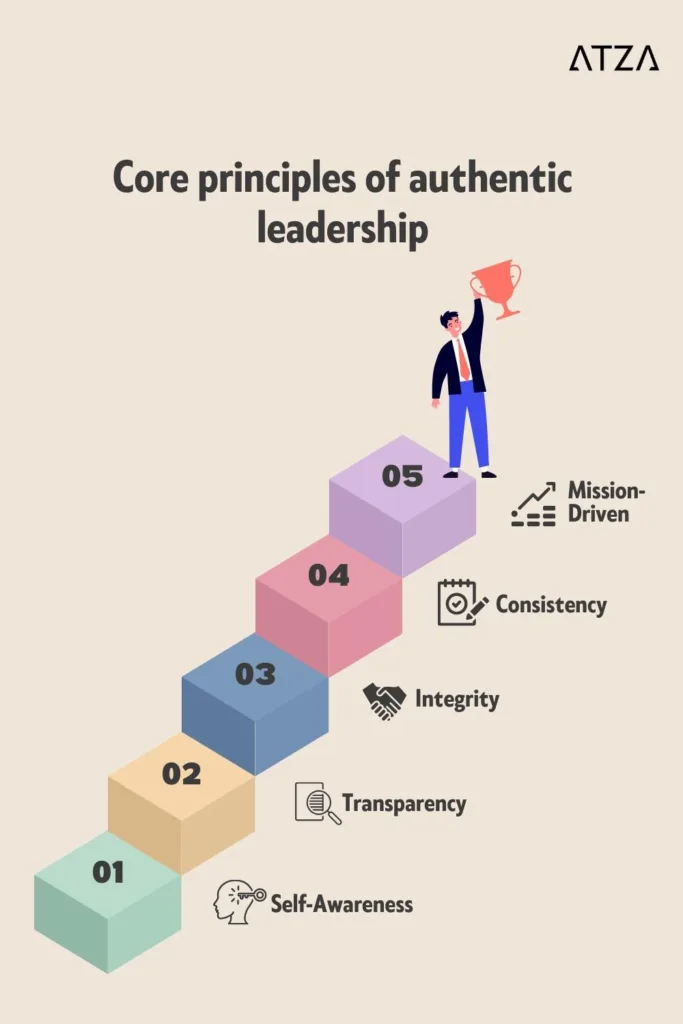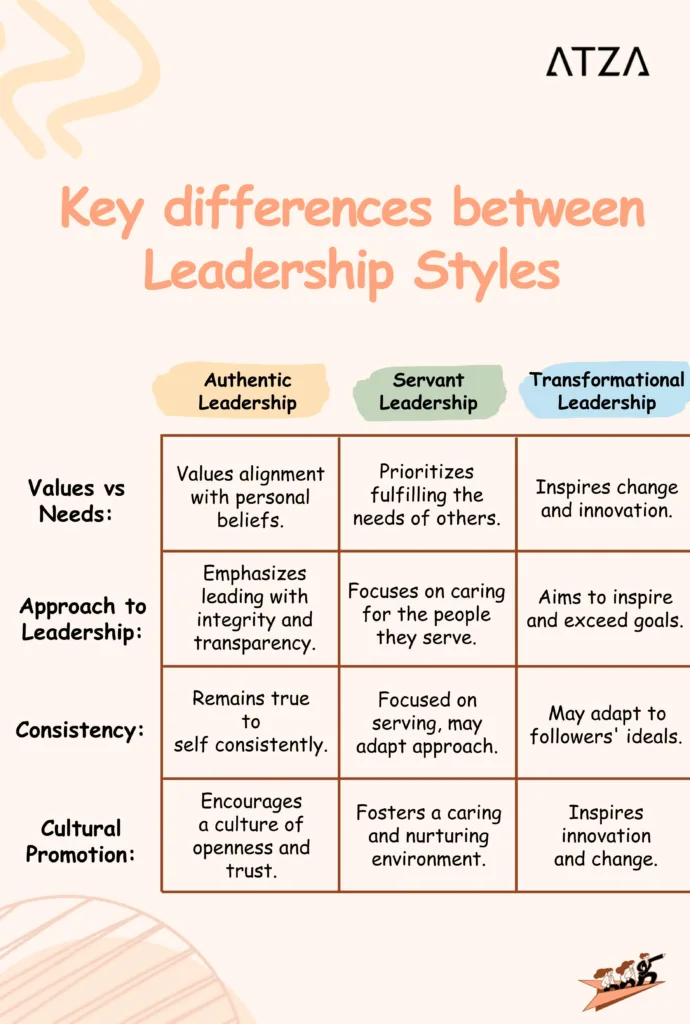Throughout the ages, authentic leaders have helped shape history, business, and even our lives today. Authentic leadership is vital in inspiring enthusiasm and loyalty from those around us – whether it’s a team of employees or an entire nation.
But what does authentic leadership mean? What traits do these successful and influential people possess that make them so memorable?
In this blog post, we will explore examples of authentic leaders, their history, and factors that they have contributed to their success in business contexts and provide resources for training yourself as an effective leader with characteristics of authenticity at its heart.
So, buckle up your seatbelts as we take you on a voyage through time to discover what sets apart a truly successful leader!
Table of Contents
Understanding Authentic Leadership: Definition and Overview

Authentic leadership is a leadership style that emphasizes the genuineness and integrity of the leader.
It’s about being true to one’s personality, values, and beliefs while leading others.
Authentic leaders’ characteristics involve being self-aware, open, transparent, and consistent in their actions, fostering trust and respect among their team members.
The core principles of authentic leadership include the following:
- Self-Awareness: Authentic leaders clearly understand their strengths, weaknesses, and emotions. They know who they are and what they stand for, which guides their decisions and actions.
- Transparency: They communicate openly and honestly with their teams, fostering an environment of trust and mutual respect.
- Integrity: Authentic leaders uphold high ethical standards. They align their actions with their values, demonstrating reliability and consistency.
- Consistency: They are consistent in their actions, contributing to a predictable and safe environment.
- Mission-Driven: They are passionate about their work and driven by a mission beyond mere profit generation.
Exploring the Origins and History of Authentic Leadership Theory
The roots of authentic leadership theory can be traced back to the late 20th century.
Bill George’s seminal work, “Authentic Leadership: Rediscovering the Secrets to Creating Lasting Value” (2003), is often credited as a driving force behind the concept. George, himself an accomplished leader as a former CEO of Medtronic, emphasized the importance of leaders being genuine and true to their values.
However, the idea of authenticity in leadership goes back even further. The ancient Greek philosopher, Heraclitus, is known for his belief in the authenticity of individual personality.
His philosophy promotes the intrinsic value of staying true to oneself, a concept that resonates with the core principles of authentic leadership.
More recently, research has delved into the positive impacts of authentic leadership on individual and organizational performance, engagement, and job satisfaction. These studies have emphasized how authentic leaders can inspire trust, engender employee loyalty, and create a healthy, productive work environment.
In today’s volatile business landscape, the need for authentic leadership is more vital than ever.
Differentiating Authentic Leadership From Other Leadership Styles

Authentic leadership differs significantly from other leadership styles, such as servant leadership or transformational leadership.
While these leadership styles have overlapping dimensions with authentic leadership, they have distinct characteristics and focuses.
Servant leadership, for instance, is a leadership approach where the leader prioritizes the needs of their team over their own. Servant leaders focus primarily on the growth and well-being of the people and communities they serve, which is not necessarily the main priority for authentic leaders.
Authentic leaders, while they value and care for their team, emphasize remaining true to their values and beliefs, leading with integrity and transparency.
Transformational leadership, on the other hand, revolves around inspiring and motivating team members to exceed beyond their own goals and interests for the betterment of the organization. While transformational leaders inspire change and innovation, their authenticity may sometimes be questioned as they adapt their approach to fit the ideal image that their followers seek.
In contrast, authentic leaders consistently remain true to who they are, acting in alignment with their values and beliefs, even when it may not be the most popular approach.
They believe in openness, trust, and transparency, promoting a culture where both leaders and followers feel free to be their authentic selves.
Unlock your entrepreneurial potential with the “Top Entrepreneurial Insights: Best Podcasts For Entrepreneurs in 2023“, empowering you with invaluable insights and wisdom on your journey to success.”
Authentic Leadership in Business: Examples and Case Studies of Famous Authentic Leaders
In the business world, authentic leadership is not just a theoretical concept; rather, it is a practice that has been embraced by some of the most successful and influential leaders of our time.
Let’s explore some real-world examples of authentic leaders who have left their mark through their unflinching commitment to their core values and beliefs.
Steve Jobs: One of the Visionary Authentic Leaders of this Era
Steve Jobs, co-founder of Apple Inc., exemplified authentic leadership throughout his career. Despite facing numerous obstacles and setbacks, Jobs held fast to his vision of revolutionizing the tech industry.
His commitment to innovation and design excellence was unwavering, even when it meant challenging industry norms or facing criticism. Jobs was known for his transparency, often sharing his thought process and decisions with his team and the public.
Perhaps, his most authentic characteristic was his acceptance of his imperfections. Jobs’ 2005 Stanford Commencement address stands as a testament to his authenticity, where he shared his life experiences and urged graduates to pursue their passions and listen to their hearts.
Indra Nooyi: Leading with Authenticity at PepsiCo
Indra Nooyi, former CEO of PepsiCo, stands as an inspiring example of an authentic leader.
Over her twelve-year tenure as CEO, Nooyi transformed PepsiCo, driving growth and innovation while also prioritizing corporate social responsibility. Her leadership was characterized by a strong commitment to her values, a willingness to make tough decisions, and a deep sense of responsibility towards all of PepsiCo’s stakeholders.
Nooyi’s leadership reflects her belief in “Performance with Purpose.” This approach aimed to deliver top-tier financial performance while being responsive to the world’s needs.
Nooyi’s push for healthier product options, eco-friendly packaging, and initiatives like providing access to safe water in developing countries highlights her authenticity and dedication to a larger purpose.
Her interview with David Bradley offers valuable insights into her leadership journey and approach to authentic leadership at PepsiCo.
Howard Schultz: Authentic Leadership at Starbucks
Howard Schultz, the CEO of Starbucks, is another compelling example of an authentic leader. Schultz’s approach was built upon the foundations of honesty, integrity, and treating employees as partners.
He was at the forefront of offering comprehensive healthcare coverage and stock options to all employees, including part-time workers, a testament to his genuine concern for employee welfare.
Schultz believed that the success of Starbucks was predicated on the well-being and satisfaction of its employees, whom he referred to as “partners.” This belief led him to establish Starbucks’ comprehensive benefits program, a leading example of how companies can care for their workforce. Schultz used the tactics of shared benefits, consultation and collaboration, emotional calibration, and consistency to motivate his new employees.
His authentic leadership was instrumental in building Starbucks into a global brand and creating a company culture that values respect, dignity, and corporate responsibility.
Developing Authentic Leadership Skills: Training and Practices

Developing authentic leadership skills is an integral part of becoming a successful leader. The best way to do this is through practice and training.
Here are some key areas that leaders should focus on to become better at authentically leading teams:
- Listen with patience and empathy: Authentic leaders take the time to really listen to what their team members have to say. This helps them to understand their team’s perspectives and needs, allowing for better collaboration and problem-solving.
- Communicate clearly: Authentic leaders make sure that their communication is clear and compelling, ensuring that everyone understands the message they are trying to convey.
- Have a Vision: Leaders should be able to articulate a clear vision of where they want to take their team and how they plan to get there.
- Inspire: Authentic leaders will be able to inspire and motivate their teams with passion and enthusiasm, encouraging them to work hard towards the common goal.
- Lead by example: Leaders should strive to lead by example in all aspects of their leadership roles, displaying integrity, honesty, and respect at all times.
- Celebrate success: Authentic leaders recognize and celebrate the successes of their team and their personal successes. This helps to build morale and strengthen team bonds.
By working on these key areas, authentic leaders can become even more effective at leading their teams and creating an inspiring work environment.
This will help create a culture of success and help organizations reach their goals.
Conclusion
Authentic leadership is an essential quality for any leader to possess. By understanding the characteristics of authentic leaders and implementing strategies to become better at leading teams, organizations can reap the rewards of having strong, inspiring leaders.
Authentic leaders set an example for their team members and help create a culture of success within their organization.
With this in mind, business leaders need to invest in training and development opportunities that will help them become more effective at leading their teams.
With proper knowledge and practice, anyone can become an authentic leader who sets an example for others to follow.
Frequently Asked Questions (FAQs)
What is the significance of authentic leadership in today’s business world?
Authentic leadership is essential in today’s business world as it fosters trust, encourages open communication, and promotes integrity within the organization. As businesses face rapid changes and uncertainties, authentic leaders are vital in navigating these challenges while maintaining team morale. They embody the values they promote, inspire loyalty, and demonstrate a clear vision, making them invaluable assets in any business environment.
Are there any potential challenges in practicing authentic leadership?
Absolutely, like any leadership style, authentic leadership comes with its own set of challenges. Leaders may struggle with maintaining authenticity while adapting to changing environments or conforming to corporate norms. Being overly transparent may also be a risk, potentially harming the organization or team dynamics. Yet with careful balance, the benefits of authenticity can outweigh these potential challenges.
Are there any specific industries where authentic leadership is more relevant?
Authentic leadership is relevant across all industries, enhancing trust and transparency. However, it is essential in sectors like healthcare, education, and the non-profit world, where values-based decision-making is crucial. It also holds significant value in the tech industry, where rapid changes and innovation require leaders to be genuine and adaptive.
How can authentic leadership benefit organizations?
Authentic leadership can drive significant benefits for organizations. It fosters a culture of transparency, integrity, and trust, leading to higher employee engagement and satisfaction. This positive environment can boost productivity and innovation, ultimately resulting in better organizational performance. Furthermore, authentic leaders can navigate changes and uncertainties effectively, contributing to business resilience and long-term success.
How is Martin Luther King an authentic leader?
Martin Luther King Jr. epitomizes an authentic leader as he genuinely embodied his beliefs, consistently communicated his vision for social justice, and remained unwavering in his commitment despite intense challenges. He led further with innate empathy and understanding, emphasizing nonviolent resistance and always standing by his core values. His inspiring speeches and actions reflect his genuine passion and dedication, making him an enduring example of authentic leadership.







Leave a Reply